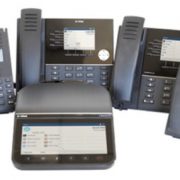Choosing the Right Cloud Infrastructure for Your Organization
By definition, Unified Communications as a Service (UCaaS) is a unified telecommunications system based in the cloud. But which cloud? Your own, or one you share with people and organizations you don’t know?
Public and private cloud environments are very different regarding security, flexibility, performance, control, and other essential factors. Today, organizations can experience the best of both worlds — with some due diligence.
What is a Public Cloud?
In a public cloud environment, multiple organizations share space on a server or, more likely, a virtual server. This platform offers the benefits of simplicity, scale, and savings.
- Companies don’t have to worry about maintenance; the public cloud service provider handles updates and upgrades.
- Organizations can add or decrease seats based on business demands.
- A public cloud platform eliminates the expense of maintaining communications equipment and servers.
At the same time, a public cloud has limitations. Operating systems and software, for instance, are upgraded when the public cloud service provider — not the client organization — chooses. Users who want customization, such as other applications or additional security for their virtual machines, are generally out of luck.
Think of it as an apartment building filled with tenants. The building owner, not the tenants, decides when to shovel the snow off the steps and repave the parking lot. The tenants can request security cameras or electrical vehicle chargers, but the building owner ultimately decides whether to install them.
What is a Private Cloud?
A private cloud system works like a public cloud, but as the name suggests, the resources are limited to a private network. These systems pair the efficiency of virtualization and a centralized infrastructure with the security of dedicated virtual servers. A private cloud gives organizations great flexibility, maximum control, and security.
- Like public clouds, private clouds are scalable and cost-effective.
- Upgrades and updates happen when the company chooses.
- Organizations determine who and what can access the private cloud, significantly reducing the data breach risk.
However, adding and managing data centers, servers, and phone lines can get expensive and complicated and take engineering staff away from other duties. System maintenance can also require staff that may be difficult to find and expensive. In addition, modern communications requirements can mean significant liability.
Many services, including e911 and the calculation and remittance of regulatory fees and taxes, are required for cloud-based systems. Companies that maintain a private cloud must stay abreast of — and comply with — government regulations, such as STIR/SHAKEN compliance; Kari’s Law, which ensures the ability to dial 911 directly; and RAY BAUM’s Act, which requires that all 911 calls include dispatchable location information.
What is a Managed Private Cloud?
The expense and liability of managing data centers have driven many organizations to migrate their private cloud environments to a managed private cloud service. This third offering combines many of the benefits of a public cloud with the increased control and security of a private cloud.
- Service providers handle maintenance and upgrades at the customer’s convenience.
- Companies have dedicated virtual servers for each unique application.
- Regulatory compliance responsibilities (e.g., 911-related services, calculation/collection/remittance of regulatory fees and taxes) lie with the service provider.
- Billing services lie with the service provider.
- Geo-redundant data centers offer enhanced security and reliability.
- Service providers include all inbound/outbound calling services within the 48 contiguous US.
Choosing the Right Service Provider
For more than 40 years, we’ve served as a trusted partner to innovative DC region organizations that need intelligent communications solutions to engage with their clients and accelerate operations.
Let’s explore which cloud infrastructure approach and customized UCaaS can help grow your business. Contact TCI today at (703) 321-3030 or GetHelp@tcicomm.com.













Leave a Reply
Want to join the discussion?Feel free to contribute!